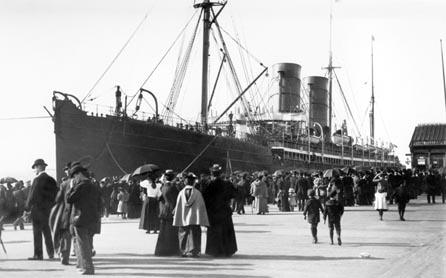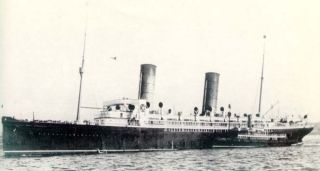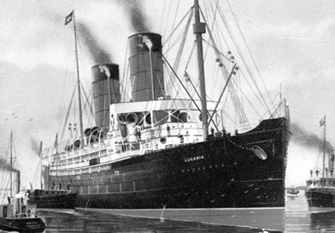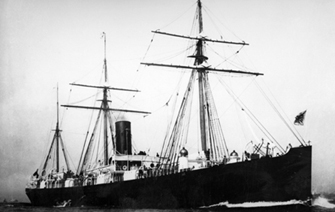Here are The Ships that carried my family to America.

The Etruria, March 26, 1905 - Papa Dave Dermon

Built by John Elder & Company, Glasgow, Scotland, 1884.
8127 gross tons; 520 (bp) feet long; 57 feet wide.
Compound engine, single screw. Service speed 19 knots.
1510 passengers ( 550 first class, 160 second class, 800 third class ).
Built for Cunard Line, British flag, in 1884 and named Etruria.
Liverpool-New York service.
Captured trans-Atlantic Blue Ribbon for speed in 1885.
Laid up 1908, and scrapped in England in 1909.

The Lucania, August 5, 1905 - Mollie Dermon


The S/S Lucania was
built in 1893 at Fairfield Shipbuilding Companie in Glasgow for Liverpool
to New York
service. She had
accommodation for 600 1st class, 400 2nd class and 1,000 3rd class
passengers.
When Cunard Lines decided to build the Campania and Lucania, the Battle for the Blue
Riband entered a new phase ... In the last years of the 19th century, this battle was
fought between England and Germany, who made significant investments in their fleet. With
the building of those two new ships, Cunard began a period of four years in which the
Riband was theirs without exception.
The Lucania was launched on 2 February 1893. On
September 2nd 1893, she started on her maiden voyage from Liverpool to New York
where she arrived on September the 9th. On the maiden voyage she set a new
record crossing from Liverpool to New York. Together with her sister ship she
continued to set new speed records, in 1894 she broke the record in August,
September and in October, doing average speeds of 21,49 kts, 21,66 kts and 21,75
kts. and remained unchallenged until 1898 when the German liner, Kaiser Wilhelm
der Grosse, took all the Atlantic records and the Blue Riband.
The Lucania was a steady and reliable ship and was in Cunard service until 1909. At that
time the other Cunarders Mauretania and Lusitania were into service and the older ships
could be missed. On 14 August 1909, a fire broke out on board the Lucania while
in Liverpool at the Huskisson Dock. The damage
caused by the fire was considered too substantial to repair and the Lucania was towed to
Thomas Ward ship
breakers at Swansea.
Ship's Statistics
Gross tonnage : 12,952 tons
Length : 188,6 m
Width : 19,9 m
Speed : 21 knots, max. 23 knots
Hull : steel
Number of funnels : 2
Number of screws : 2
Engines : 2 triple expansion steam engines, giving 30,000 IHP.
Capacity : 550 passengers in 1st, 280 in 2nd class and 1,000 in steerage.

The Maasdam, September 6, 1897 - Esther Dermon
Bronstein

Built by Harlan & Wolff Limited, Belfast, Northern Ireland, 1871.
3984 gross tons; 420 (bp) feet long; 40 feet wide.
Compound engine, single screw.
Service speed 15 knots.
1166 passengers ( 166 first class, 1000 third class ).
Built for White Star and Dominion Lines, in 1871 and named Republic. Liverpool-New York
service.
Sold to Holland - America Line, Dutch flag, in 1889 and renamed Maasdam. Rotterdam-New
York service.
Sold to La Veloce Line, in 1902 and renamed Citta Di Napoli.
Italy-New York service.
Used as accommodation ship for earthquake victims at Messina 1908-09.
Scrapped in Italy in 1910.

The Anchoria, July 24, 1893 - Samuel Bronstein

Built by Barrow
Shipbuilding Company, Barrow-in-Furness, England, 1875. 4,168 gross tons; 408 (bp)
feet long; 40 feet wide. Compound engine, single screw. Service speed 14
knots. 1,100 passengers (200 first class, 100 second class, 800 third class).
Built for Anchor
Line, British flag, in 1875 and named Anchoria. Glasgow-New York service.
Sold to other British owners in 1904. Sold to Hamburg-American
Line, German flag, in 1904. Scrapped in Germany in 1932.
